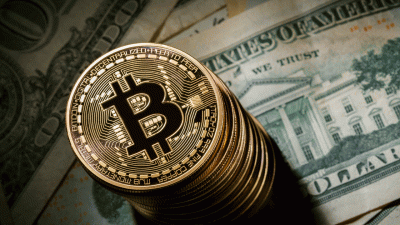Hopes and Nightmares over Cryptocurrency and the Bitcoin

The crystal ball gazers, astrologers and tea leave readers have been suffering a lingering fever of late. Bitcoin recently romped through the $10,000 barrier, an event that sent speculators swooning and conservative voices into a gloomy mood of pessimism. Bitt founder and director Gabriel Abed was rushing to declare the imminent funeral oration for cash, a newly founded digital frontier that would envelop all before it. “All currencies will be digitized. Cash has seen its days.”
James Altucher, a tech investor with the usual grammatically challenged credentials (he runs Choose Yourself Financial), was given time on CNBC to spout several theories about how strength would beget strength in the currency revolution.
The mainstay of his prediction is the way currency is altering (remarkable!) and how there have only been a few periods in history when this has happened. Gold came after barter; then paper money made its appearance, to be followed by the rise of the cryptocurrency.
His stab at value, taken with the kind of abandon a lecherous drunk unconcerned about consequences would have, is that bitcoin will reach a million dollars a coin.
“There’s $200 billion in cryptocurrencies out there and over $200 trillion in demand for money – that’s the amount of paper currency and gold bullion in the world.”
What are some of Altucher’s other predictions? A currency will fail – take your pick. (He suggests Argentina or Venezuela as appropriate victims.) Banks will fold, caving in to the bitcoin mania. A dotcom equivalent bust will be repeated, the US government will secretly stash a cryptocurrency of its choice, and the story will go on.
A sense about the dangers felt in traditional communities can be gathered by the remarks of Nobel Prize winner in economics, Joseph Stiglitz. Outlaw it, he urges.
“Bitcoin is successful only because of its potential for circumvention, lack of oversight.”
Unfortunately for Stiglitz, this would assume that traditional currencies are somehow stable, immune to the speculative bubble.
“It’s a bubble that’s going to give a lot of people a lot of exciting times as it rides up and then down.”
Certain institutions held with understandable contempt and suspicion are the ones most concerned with where these digital currencies will go. Much of this is self-interest: transactions in digital currencies tend to be associated with subversion rather than conformity. Banks, after all, were the first big rogues in the business, likely to catch a cold the moment the term “regulation” was mentioned.
JPMorgan Chase & Co. Chief Executive Officer Jamie Dimon goes even further: dealing in such currencies is tantamount to lunacy, a breach deserving the harshest treatment from the firm. Any employee trading in bitcoin, suggested Dimon, should see them packing.
“I’d fire them in a second. For two reasons: It’s against our rules, and they’re stupid. And both are dangerous.”
A world without banks would be a world without a certain species of gargantuan crime, but the astrologers prefer to see them as ultimately accepting the value of such currencies. Eventually, the use of blockchain technology underpinned by secure cryptography will find its way into more conventional circulation.
“I see a different future where central banks are issuing digital dollars,” fantasises Abed, “a new economic age of digital dollars.”
States are also on the cryptocurrency march, hardly surprising given the prospects open to control, regulation and monitoring. Every heresy, in time, encourages incorporation, domestication, adaptation. Kyrgyzstan and Russia (it will be called the CryptoRuble, according to such figures as Nikolay Nikiforov, the country’s minister for communications) are working on the project.
Other states are taking a different stance, suggesting the opening up of a future fault line of disagreement.
“The government’s position is clear,” suggests Arun Jaitley, Indian finance minister, “we don’t recognise this as legal currency as of now.”
Chinese authorities have taken a dim view of the currency. Deputy governor of China’s People’s Bank, Pan Gongsheng, who also doubles as head of the State Administration for Foreign Exchange, claimed it necessary to ban bitcoin trading and initial coin offerings (ICO), a move that Beijing made some three months ago.
“If things were still the way they were at the beginning of the year, over 80 percent of the world’s bitcoin trading and ICO financing would take place in China – what would things look like today?”
The words of frightened officialdom could also be found in the utterances of US Federal Reserve vice-chairman for supervision, Randal Quarles.
“Without the backing of a central bank asset and institutional support, it is not clear how a private digital currency at the centre of a large-scale payment system would behave, or whether the payment system would be able to function, in times of stress.”
The truest test of whether such currencies will survive must lie in their ultimate acceptance by the authorities. But there is a fundamental paradox at work here. Traditional banks and officials, with exceptions, do not like this alternative currency culture, fearing volatility. Yet it is precisely this volatility and unregulated conduct that underpinned the subprime mortgage collapse and the governance of US Federal Reserve Chairman Alan Greenspan.
Regulation through the late 1990s was a dirty term, an unwarranted fetter on inventiveness in finance. The partial repeal of the Glass-Steagall Act under the Clinton administration separating commercial and investment banking was the brightest of green lights to speculators, even if debate continues about its actual effects. Now, the very individuals who saw the predations of rampant capitalism come back to roost find a mirror of themselves: the crypto currency rebel keen to upset the order. In time, the sceptics may well be won over, and the prospects for more crashes, unstable deals, and a rocky economy, will come full circle. Plus ça change.
Dr. Binoy Kampmark was a Commonwealth Scholar at Selwyn College, Cambridge. He lectures at RMIT University, Melbourne. Email: [email protected]

